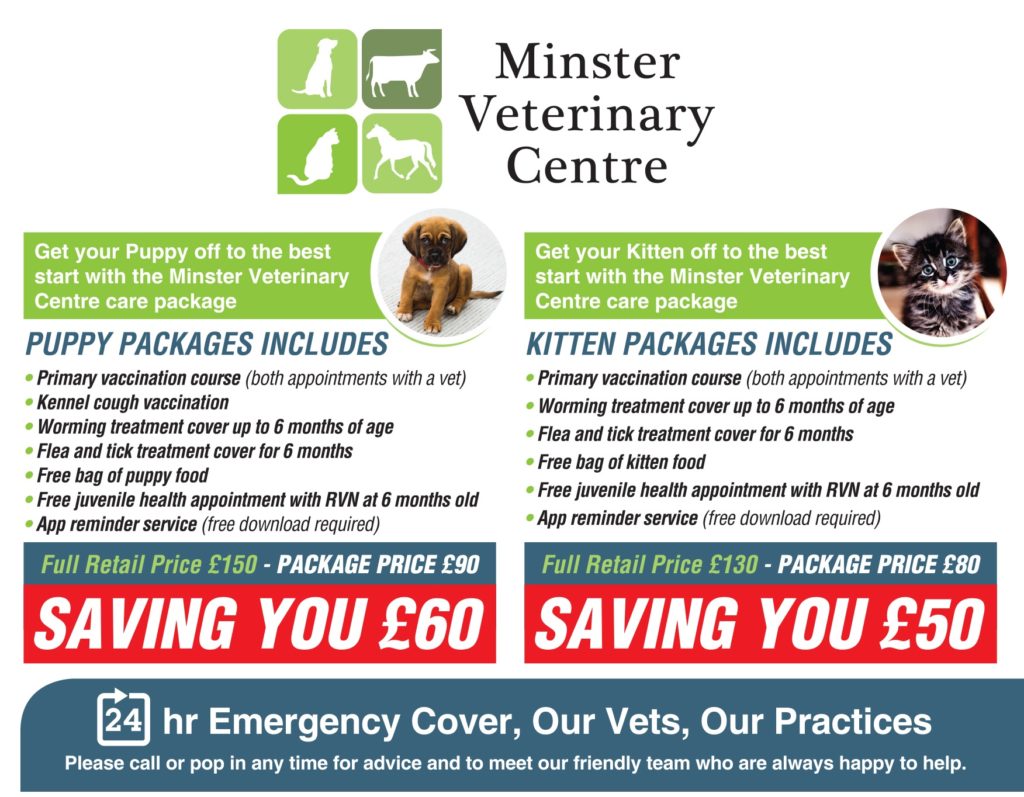 Vets across the UK have been warned to brace themselves for a parvovirus surge after reported cases doubled in the first three months of 2021.
Vets across the UK have been warned to brace themselves for a parvovirus surge after reported cases doubled in the first three months of 2021.
The warning comes after data from pet emergency service Vets Now showed a 129% increase in suspected cases of the potentially fatal disease in the first three months of 2021, compared with the same period last year.
Potential surge
IVC Evidensia – which owns Vets Now – has also released research showing that up to 45% of registered pet owners hadn’t got vital vaccinations and boosters.
It’s thought a potential surge in cases could be coming as a result of the massive boom in lockdown puppies and concerns over still attending surgeries for routine jabs.
Real challenge
Edward Davies, chairman of the UK clinical board at IVC Evidensia said: “There are several reasons why we are really concerned about seeing an increase in cases of parvovirus and our practices have been taking steps to brace themselves for a potential resurgence in this disease, as well as ensuring they are encouraging their clients to keep up to date with dog vaccinations.
“Due to the lockdown puppy boom and the whole COVID-19 situation, ensuring preventive health care has been correctly followed for all pets has been a real challenge. The potential resurgence of parvo has been quite a worry during this time.”
SOURCED FROM VET TIMES
What is Parvovirus?
Canine Parvovirus is a highly infectious disease that can be fatal. Many dogs who are diagnosed with parvovirus will die with or without veterinary intervention.
The virus attacks cells in a dog’s intestines and stops them from being able to absorb vital nutrients. This means that a dog or puppy will become very weak and dehydrated.
It is also known as canine parvovirus, parvo or CPV.
How do you know if your dog has parvovirus?
Symptoms of parvo include foul-smelling diarrhoea with blood in it, vomiting, loss of appetite, collapse, depression, fever and sudden death.
Who is at risk?
Young puppies and unvaccinated dogs, including those who have not had their booster injections, are most at risk from becoming victims of parvovirus.
Puppies go downhill very quickly because the symptoms caused by parvovirus make them very weak, and mean their immune systems have to work very hard to fight the disease. Youngsters between six weeks and six months old are also more susceptible to secondary infections, or they may die from dehydration.
Parvo outbreaks are most commonly seen in towns and cities with a large population of unvaccinated dogs.
Is parvovirus contagious to other dogs?
Yes. Parvo is highly contagious to other dogs and spreads very easily around dogs and puppies that aren’t up to date with their vaccinations.
It takes up to seven days for a dog to show signs of having parvovirus after they have caught it.
Parvovirus spreads through body fluids, including in a dog’s poo and vomit. It is extremely hardy and can survive in the environment outside the body – for example in the grass at a park – for at least six months, and possibly much longer. Your dog can even contract parvovirus by sniffing another dog’s poo and it’s not uncommon for dogs to catch parvovirus when out for a walk.
If your dog has come into contact with bedding, food and water bowls, carpet, or a kennel that a dog with parvovirus has touched, they can catch the virus. Parvovirus can also be spread on shoes, clothing and human hands.
It is really important to protect your dog against this horrible disease by vaccinating them.
How can I prevent my dog catching this disease?
Dogs and puppies can be vaccinated against parvovirus from the age of six weeks.
A puppy should have their first vaccine at six to eight weeks old. They will then need a second vaccine 3-4 weeks later. After that, they will need a booster vaccine at one year old. The cost of the primary course of vaccinations is £41.25 and is also included in our Puppy Package.
After this, dogs need a booster vaccination annually but the parvovirus is topped every 3rd year unless deemed high risk by your vet. This is all that is needed to prevent your dog catching this fatal disease. Annual booster vaccinations are £27.50.
Boosters are important for dogs to keep up to date with, but the time between these varies so check with your vet to see how often your dog should be vaccinated. With Covid-19, many dogs have fallen out of line with their vaccination course, there is some leeway in the timing of vaccinations, but some dogs may be required to restart the vaccination course, please contact your local practice if you are unsure over your dogs vaccination status.
Parvo and puppies
If you are getting a puppy from a breeder or rescue centre, always ask if they will have had at least their first vaccination against parvo at the time of collection. Ask for proof (a vaccination card signed by a vet or vet nurse) that they have been vaccinated and confirmation of when the next jab is due. Always be suspicious if there is not an original copy of a signed vaccination card. Ideally all puppies should be vaccinated prior to being homed.
If in any doubt over vaccination status, either contact the vet on the vaccination card (unmarked cards should be a big red flag) or assume that they aren’t covered and restart the vaccination course with your vet.
What should I do if I suspect my dog has parvo?
If you recognise the symptoms above in your own dog, call your veterinary practice immediately for advice. Make sure to tell them what symptoms your dog or puppy has, and whether or not they’ve come into contact with a dog with confirmed parvovirus.
Most deaths from parvo happen within 48 to 72 hours after the symptoms begin. The quicker you seek help, the greater your pet’s chances of survival.
Keep your dog away from other dogs as it spreads easily. Tell your vet if you also have other dogs in your household as they can give advice on how to stop it spreading around all your pets.
Don’t forget that any cases of severe gastroenteritis should be taken seriously; even if parvovirus is not the cause, contact your vet if your dog has diarrhoea or any of the other symptoms listed above.
My dog has parvovirus. What treatment is available?
There are no drugs in existence that can kill the virus.
Instead, treatment for parvo is designed to support a dog’s immune system and help their body become strong enough to fight off the disease.
Dogs and puppies with parvovirus need to be treated at a vet’s and are likely to need hospitalisation. They will be put on a drip and given intravenous fluids to stop them from becoming dehydrated. They may also be given drugs to help control vomiting, which also helps to prevent dehydration.
If a dog with parvo has caught a secondary infection as a result of a weakened immune system, they may be given antibiotics.
Dogs and puppies with parvo must be put in isolation and kept well away from other animals. Vets and nurses will wear special clothes and shoes when treating them which can be removed and sanitised to prevent the disease spreading to other patients at the veterinary surgery or hospital.
The average hospital stay for a dog recovering from parvo is five to seven days. Unfortunately, puppies are often not strong enough to survive the toll the disease takes on their young bodies and many will die.
Treatment for parvo is also very expensive because your dog will need several days’ stay in intensive care. Costs for round the clock nursing and veterinary care, medicines and fluids tot up. Bills can easily run into the hundreds, if not thousands, of pounds. Vaccination prices are much, much cheaper (£41.25 for the primary course and £27.50 for annual boosters) not to mention the emotional costs of having an extremely sick dog who is likely to die.
Can humans catch parvovirus from dogs?
Humans cannot get parvovirus from their dogs, however they can pass parvo from one dog to another on their clothes, shoes or hands.
Humans can contract a human version of parvovirus, but this is a different strain from the one that affects dogs. Humans cannot pass the human type of parvo to a dog either.




